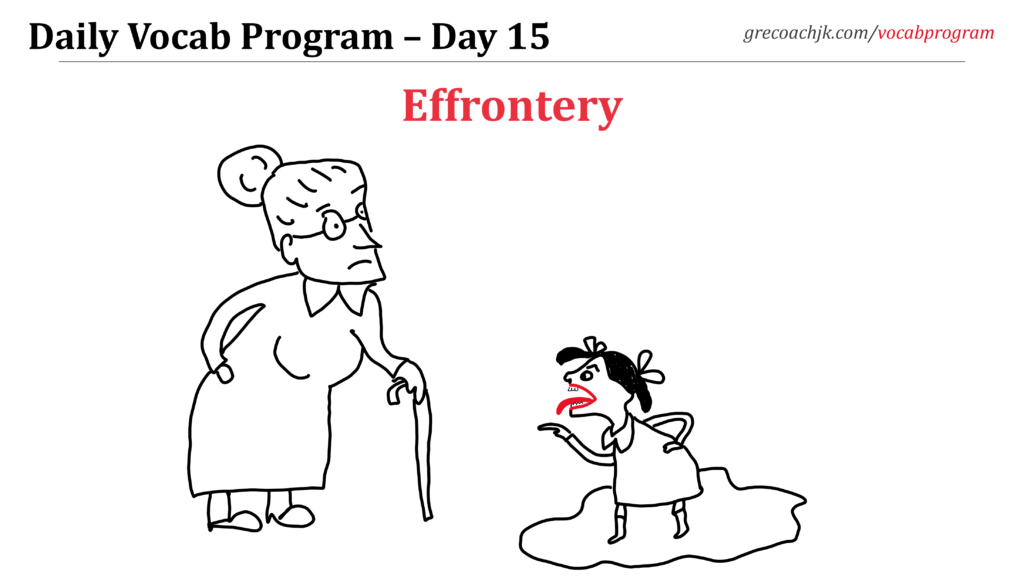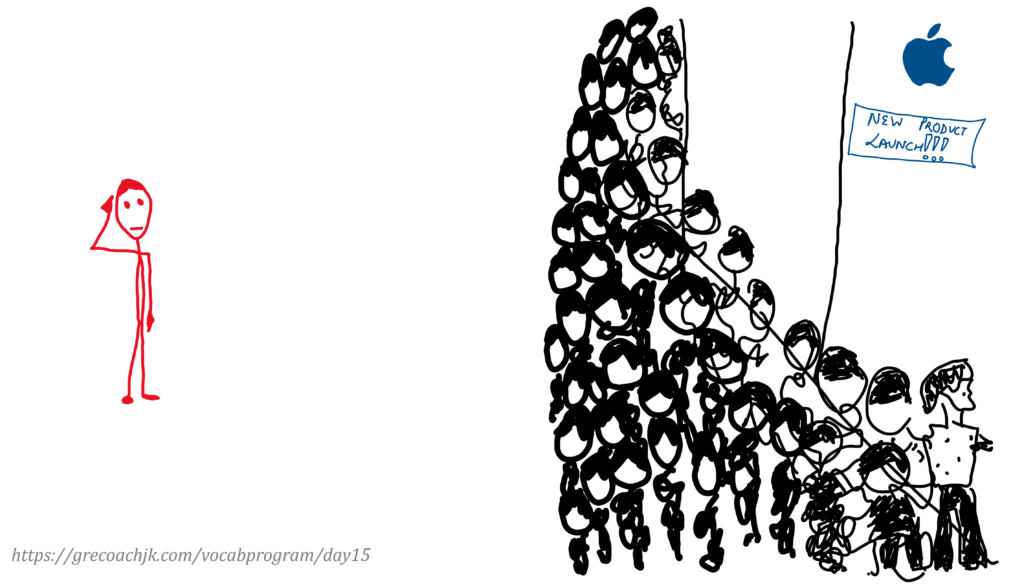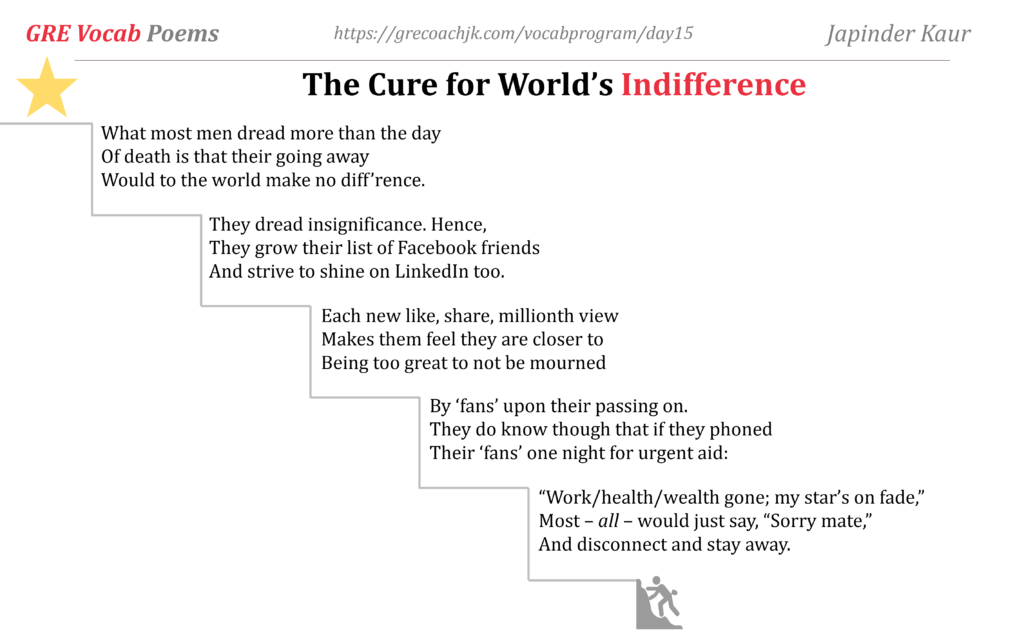The words covered in this article are vilify and vilification, audacity and audacious, affront and effrontery, maverick, indifferent and indifference. Previously done words that will reoccur today are iconoclast, conformity, connotation, dogma, figurative, and ironic.
In Day 14, you saw the 1984 Apple ad, in which the vibrant young woman who personifies Apple comes with a sledgehammer and rescues the mass of automatons from mindless conformity.
Throughout his life, Steve Jobs – the founder and long-time CEO of Apple – saw himself as an iconoclast who was fighting evil forces that threatened to engulf humanity in darkness. He spun the same narrative for Apple, with great success.
Apple’s most iconic ad campaign after the 1984 ad was its 1997 Think Different campaign.
Here is the text of the free-verse poem read by the voiceover:
Here’s to the crazy ones. The misfits. The rebels. The troublemakers. The round pegs in the square holes. The ones who see things differently.
They’re not fond of rules. And they have no respect for the status quo.
You can quote them, disagree with them, glorify or vilify them. About the only thing you can’t do is ignore them. Because they change things. They push the human race forward.
And while some may see them as the crazy ones, we see genius. Because the people who are crazy enough to think they can change the world, are the ones who do.
Rob Siltanen
Vilify
To vilify someone means to speak ill of them or to defame them. The noun form of the word is vilification.
Mnemonic: Associate vilification with ‘villain.’ A ‘villain’ is the evil person in a story who makes life difficult for the hero. To vilify somebody is to say that they are a villain (that is, to say that they are a bad person or do bad things).
If you write an article in a newspaper calling a politician unkind and corrupt, you are vilifying him. You will be called the vilifier of this person regardless of whether your statements are true or false. He may indeed be quite unkind and corrupt and, therefore, you may think yourself well justified in calling out his flaws, but your article will still get called a vilification piece.
It would, of course, be worse to vilify someone based on falsehoods, for example, by making corruption charges against an honest and upright politician or by starting a false rumor that they are having an extramarital affair. Another way to vilify a person is by publicly ridiculing them, for example by portraying them as a bumbling fool.
*
The Think Different ad was quite a stirring montage of many great heroes of world history. Jobs’ biographer Walter Isaacson remarks:
“Very few other companies or corporate leaders—perhaps none— could have gotten away with the brilliant audacity of associating their brand with Gandhi, Einstein, Picasso, and the Dalai Lama; Jobs was able to encourage people to define themselves as anticorporate, creative, innovative rebels simply by the computer they used.”
Steve Jobs, by Walter Isaacson, Page 332
Audacity
The noun audacity means fearless boldness. The related adjective is audacious.
Audacity comes from the Latin audax, which means ‘daring.’ Also related is the famous Latin proverb “Audaces fortuna iuvat,” which means ‘fortune favors the bold.’
Apple was quite audacious in the brand narrative it sought to spin: its users were daring rebels and iconoclasts while the users of other brands were no better than mindless herds of sheep. Some such advertisements worked, for example the 1984 ad and the Think Different campaign. Others failed miserably. The ad campaign launched in the year after the iconic 1984 was titled Lemmings. Watch it below:
The businesspeople who had bought an IBM computer – the very people who were Apple’s target customers – felt affronted by this ad: how dare Apple imply that they were so stupid or powerless that they would allow themselves to be blindfolded, then shuffle obediently into a line, and march off a cliff!
Affront – Effrontery
The word affront can be used both as a verb and a noun. As a verb, it means to insult in front of everyone by showing contempt or disrespect. As a noun, it means an open insult.
The Latin word frons means ‘forehead’ and the prefix ad- means ‘to.’ So, the image conveyed by affront is ‘to strike at the forehead’ => to insult.
Another word that comes from the Latin frons is effrontery, which means shameless or disrespectful boldness, or an act of this. The Latin prefix ex- means ‘out’. So, the image that is baked into the word effrontery is ‘to put out one’s forehead’ => rudeness
You learnt the word audacity a few minutes ago and might wonder about its difference from effrontery. Well, the difference between these two words lies in their connotation.
- Effrontery is a negative word, while
- audacity is a neutral word;
- ‘shameless audacity’ equals effrontery.
A person has effrontery when some action of theirs makes us feel:
- Either shocked enough to say, “You won’t believe the nerve this person has!”
- Or insulted enough to exclaim, “How dare this person (to do X to me)?”
The old lady in the image below is likely to tell her friends: “When I asked the little Miss Crawley to not play in the mud, she had the effrontery to stick her tongue out at me!”

Of course, what the old lady sees as effrontery may seem like admirable audacity to little Miss Crawley’s agemates. Like beauty, effrontery lies in the eyes of the beholder.
IBM customers were greatly offended at the effrontery of Apple in portraying them as unthinking automatons in the Lemmings ad, while Apple had got away with a similar portrayal of them in the 1984 ad (recall the unthinking automatons sitting on chairs obediently listening to the Big Brother). The line between audacity and effrontery is a thin one, indeed, and not always easy to foretell.
*
In cultures that highly value community and social good, nonconformity is often seen as an affront to the respected norms of the society. On the other hand, the individualistic American culture often sees nonconformity as heroic.
“[The] narratives of art, politics, and business idolize the person who triumphs against the odds, with only himself or herself to answer to. The lone wolf. The stranger in town. The maverick. The plucky kid. . . You’ve only got yourself, in the end. It’s all up to you.”
Andi Zeisler, We Were Feminists Once
Maverick
The noun maverick means a nonconformist, someone who does not belong to the herd.
The word maverick is derived from a proper noun. Maverick comes from the surname of Samuel A. Maverick, a nineteenth-century American real estate businessman and politician. During the 1840s, a person who had taken a loan from him was unable to repay in cash and instead settled the debt by giving his herd of 400 head of cattle to Mr. Maverick, who had zero interest in cattle-ownership.
As animals were fed in open pastures during those days, it was a common practice for all cattle-breeders to brand their own cattle with a unique identification mark to avoid potential ownership disputes. But Samuel Maverick was utterly indifferent to his cattle and never bothered to get the offspring of his cattle branded.
Indifferent
The adjective indifferent means unconcerned. If you are indifferent to something, you have no interest in it whatsoever; you do not care about what happens to that thing. The noun form of the word is indifference.
If people in Samuel Maverick’s neighborhood saw an unbranded calf roaming around, they would joke that it must be Maverick’s. Slowly, the phrase ‘it must be Maverick’s’ changed into ‘it must be a Maverick’ and still later, the capital ‘M’ became a small ‘m’ and the word came to be used figuratively, for anybody who was different from the common herd, and refused to brand himself under any ideology or creed. So, a person of independent mind, who does not conform to established rules and dogma, can also be called a maverick.

As noted earlier in this article, individualist cultures tend to celebrate mavericks and use the phrase ‘herd tendency’ (= the desire to conform to conventions) in a derogatory sense. By carefully establishing its iconoclastic credentials – through ad campaigns such as 1984 and Think Different – Apple was able to position its products as the identification proofs of nonconformity.
Lots of people bought into this cozy narrative that the mere ownership of one brand of phone or laptop will set them apart from the herd, resulting in ironic scenes such as the one shown below, where the lone wolf, the nonconformist, is in fact the one person who is not standing in the miles-long line waiting eagerly for his turn to buy a newly launched product of the company.

Bill Watterson, the creator of Calvin and Hobbes, also once noted the same irony:
“Nowadays, ads don’t just sell a product. They sell an attitude! Look at this one! Here’s a cool guy saying nobody tells him what to do. He does whatever he wants and he buys this product as a reflection of that independence. So basically, this maverick is urging everyone to express his individuality through conformity in brand-name selection?”
Bill Watterson, There’s Treasure Everywhere
With this, we are done with Day 15. Before you go, here are a few more usage examples of the new words you’ve learnt today.
- Declaring that to ask it to reverse itself in a case it had decided was an effrontery, the Supreme Court came down heavily on the plaintiffs.
- She felt it was a personal affront when her co-worker didn’t invite her to the team meeting.
- The employee’s effrontery in speaking to the CEO in such a disrespectful manner resulted in his termination.
- His decision to have a simple court marriage was taken by his family as a clear affront to their feelings and traditions.
- Intolerant governments tend to vilify individuals and organizations who do not conform to their political or social views.
- The artist’s maverick style challenged traditional norms and conventions, earning both praise and criticism from the art world.
- In today’s climate of aggressively-enforced political correctness, the following quote from The Closing of the American Mind, by Alan Bloom rings true:
“It became almost impossible to question the [politically correct viewpoint] without risking vilification, classroom disruption, loss of the confidence and respect necessary for teaching, and the hostility of colleagues. Racist and sexist were, and are, very ugly labels . . . which, once attached, are almost impossible to cast off.”
And, finally, here is a poem written by me about the ways in which we seek to cure the world’s indifference to us. Hope you enjoy it!
